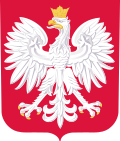A request that this article title be changed to Movement for the Reconstruction of Poland is under discussion . Please do not move this article until the discussion is closed. |
Movement for the Reconstruction of Poland Ruch Odbudowy Polski | |
|---|---|
 | |
| Leader | Jan Olszewski (1995–2011) Stanisław Gogacz (2011–2012) |
| Founded | 18 November 1995 |
| Dissolved | 23 June 2012 |
| Headquarters | Al. Zjednoczenia 17 lok. 27a, 01-829, Warsaw |
| Ideology | |
| Political position | Right-wing |
| Colours | Red White |
 |
|---|
The Movement for the Reconstruction of Poland (Polish : Ruch Odbudowy Polski, ROP) was a conservative [2] political party in Poland.